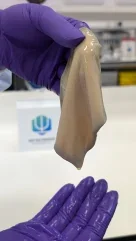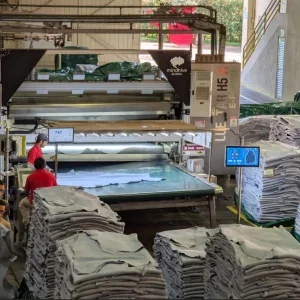
A UK tissue engineering company that successfully produced lab-grown leather earlier this year has produced an increased size of cultivated skin tissue at its laboratory in Newcastle.
Lab-Grown Leather (LGL, formerly 3D Bio-Tissues), a UK-based biotech start-up company owned by BSF Enterprise, has produced lab-grown leather grown solely from cells from an animal to produce skin to be tanned into leather for use in the luxury goods market.
The team produced an animal skin tissue measuring up to 10x10cm in size and over 2mm (2.8mm before tanning) in thickness, building on the 0.5mm thickness of tissue that was displayed at the Future Fabrics Expo leather show, back in June.
Dr Che Connon, managing director of BSF Enterprise, said the company had now developed a codified Standard Operating System, that can be transferred, translated and adopted by other companies to develop lab-grown leather using LGL’s technology.
He added: “Our tissue engineering technology has the potential to solve some of the fashion industry’s greatest ethical and environmental challenges. Technological development is progressing at an impressive speed, and the process is now ready to advance from inside our research and development lab to a pilot-scale manufacturing operation to facilitate knowledge on scale-up processes as well as supply limited amounts to partners within the fashion industry.“
LGL’s tissue-engineered skin uses only immortalised cells – isolated and collected from an adult animal following a strict and painless bioethics process – to produce a tannable skin structure in a lab. LGL’s lab-grown leather does not use any additional supporting materials, such as plastics or cellulose in the final skin product. The process makes use of a serum-free and animal-free cell culture media supplement, City-mix, which accelerates tissue formation while reducing the cost of the production process.
Similar to farm-grown leather, this lab-grown material is expected to be completely biodegradable in 10-50 years.






